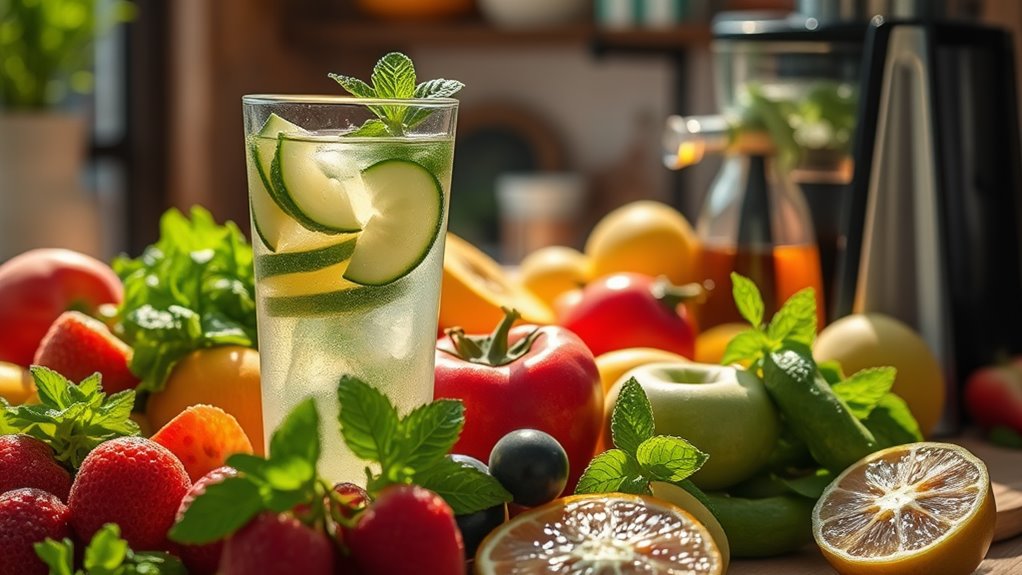The Truth About ‘Detoxing’ and What Actually Works
The truth about detoxing is that your body already has a powerful system for eliminating toxins naturally. Detox diets are often marketed as quick fixes, but they can lead to nutrient deficiencies and health risks instead. Instead of restrictive diets, focus on balanced nutrition, hydration, and lifestyle changes that support your body’s detox processes. For a better understanding of what truly works, explore the proven strategies that can enhance your well-being.
Key Takeaways
- Detox diets are popular but often lack scientific support and can lead to nutritional deficiencies and short-term weight loss that isn’t sustainable.
- The body naturally detoxifies through organs like the liver and kidneys, making extreme detox diets unnecessary for effective cleansing.
- Balanced diets rich in whole foods, fruits, and vegetables support natural detoxification processes without the risks associated with detox fads.
- Lifestyle changes such as regular exercise, adequate hydration, and stress management enhance the body’s natural detox capabilities more effectively than detox diets.
- Future detox trends emphasize eco-friendly, personalized approaches over extreme measures, focusing on holistic wellness rather than quick fixes.
Understanding Detox Diets and Their Popularity
Detox diets have surged in popularity, with the global market now valued at around $51 billion. People are drawn to these diets for their promises of quick results and ease of following specific regimens. Celebrity endorsements on social media enhance this appeal, making you think detoxing is the answer to resetting your body. Many seek real detox advice, hoping to address concerns about toxin exposure. These diets often involve juice fasting, dietary restrictions, or supplements, which cater to a desire for instant gratification. While they may seem effective, it’s essential to recognize that a balanced diet and healthy lifestyle choices can support your body’s natural detox processes more sustainably than trendy detox fads. Moreover, it’s important to note that few studies exist on the efficacy of these detoxification programs. In fact, the body has its own natural detoxification systems that efficiently eliminate waste and toxins without the need for extreme diets.
Evaluating the Effectiveness of Detox Diets
The allure of detox diets often overshadows their actual effectiveness. Despite the promises, there’s a lack of scientific support proving these diets eliminate toxins or promote lasting health benefits. Many studies have small sample sizes and flawed methodologies, making their findings questionable. While you might experience short-term weight loss due to calorie restriction, that effect usually doesn’t last. Furthermore, these diets can lead to nutritional deficiencies and other health risks because of their restrictive nature. Additionally, the detox industry is experiencing significant growth, yet little clinical evidence supports the effectiveness of detox diets. It’s worth noting that incorporating surprising foods known for their detoxifying properties can be a more effective approach to wellness. With detox products poorly regulated, you could also encounter harmful ingredients. It’s vital to remember that sustainable health practices—like balanced eating—often yield better results without the risks associated with detox diets. Focus on long-term wellness instead of quick fixes.
The Body’s Natural Detoxification Processes
Your body relies on key organs like the liver and kidneys to continuously filter out toxins and keep you healthy. The liver transforms harmful substances into safer compounds, while the kidneys guarantee your blood stays clean and balanced. Understanding these natural detox processes can help you appreciate how your body works without the need for trendy diets or products. Maintaining adequate hydration is essential for efficient waste removal and supports these vital functions. Incorporating cleansing foods into your diet can also provide additional support for liver health and enhance its detoxification capabilities.
Liver and Kidney Functions
While many people think detoxification requires special diets or products, the body’s natural processes, primarily through the liver and kidneys, effectively eliminate toxins.
The liver metabolizes and breaks down harmful compounds using its two-phase detoxification process, involving essential enzymes like cytochrome P450. These enzymes convert toxins into less harmful substances, supported by nutrients such as vitamin C and glutathione. Liver detox processes are aided by medication and nutrition in substance abuse facilities, highlighting the importance of comprehensive care. Additionally, a gentle detox routine can complement these natural processes and further enhance overall health.
Meanwhile, your kidneys filter blood to remove waste and toxins through urine, regulating body fluids to maintain ideal detoxification. Healthy hydration and a balanced diet enhance kidney function, promoting efficient toxin elimination. Protecting these organs from excessive alcohol, smoking, and poor dietary choices is crucial for supporting their significant detoxification roles.
Continuous Detoxification Process
Though many may not realize it, detoxification is a continuous process that occurs naturally within your body, engaging multiple organs to eliminate toxins efficiently. Your lungs, skin, and lymphatic system work tirelessly to remove harmful substances. Modern life, however, exposes you to various toxins, making it essential to support these natural processes through healthy lifestyle choices. A well-functioning detox system is essential for optimal health and efficiency. Incorporating nutritious, whole foods into your diet can further enhance these detoxification efforts.
| Healthy Choices | Impact on Detox |
|---|---|
| Stay Hydrated | Enhances toxin elimination |
| Eat Whole Foods | Supports digestive health |
| Regular Exercise | Promotes circulation |
Potential Health Risks of Detox Diets
When you consider detox diets, it’s essential to be aware of potential health risks.
These restrictive plans can lead to nutrient deficiencies, putting you at risk for fatigue and other health issues.
Additionally, practices like colon cleansing can disrupt your digestive system, creating more problems than they solve.
Nutrient Deficiencies Risk
Detox diets can pose significant risks to your health, mainly due to the potential for nutrient deficiencies.
When you drastically cut out essential food groups, your body may lack essential nutrients, leading to several issues:
-
Impaired Organ Function: Key organs like your liver and kidneys may struggle without proper nutrients.
-
Fatigue and Weakness: Inadequate carbs and proteins can compromise your energy production, leaving you tired.
-
Vitamin and Mineral Shortages: You might experience deficiencies in B vitamins, iron, and electrolytes, especially with fasting.
-
Long-Term Health Issues: Prolonged deficiencies can result in severe problems like muscle wasting and neurological concerns.
It’s important to prioritize a balanced diet to avoid these serious health risks.
Caloric Restriction Effects
Caloric restriction can significantly impact your health, leading to a range of potential risks that extend beyond just weight loss. It can disrupt hormonal balance, affecting fertility and reproductive health, and weaken your immune system, making you more prone to infections. Additionally, excessive calorie cutting may cause muscle loss and slow your metabolism, complicating weight management. Bone health can also suffer, increasing fracture risks. Moreover, caloric restriction can lead to fatigue and psychological issues like depression. Here’s a quick overview:
| Risk Category | Potential Impact | Key Concern |
|---|---|---|
| Fertility | Hormonal disturbances | Irregular menstrual cycles |
| Immune System | Weakened immunity | Increased infection risk |
| Muscle Loss | Slowed metabolism | Complicated weight management |
| Bone Health | Weakened bones | Higher fracture risks |
| General Health | Fatigue and depression | Psychological distress |
Colon Cleansing Dangers
While many people seek colon cleansing as a way to detoxify their bodies and enhance their health, the potential dangers associated with these practices often outweigh any perceived benefits.
Here are some risks you should consider:
-
Kidney Damage: Electrolyte imbalances can lead to kidney failure.
-
Bowel Infection: Using unsterilized equipment raises the risk of infections.
-
Dehydration: The significant fluid flushing involved can leave you dehydrated.
-
Bowel Perforation: Serious complications, especially with procedures like coffee enemas, can occur.
Instead of resorting to colon cleansing, focus on maintaining your gut health through a balanced diet and regular exercise.
Your body naturally eliminates toxins, and supporting it with healthy habits is far more effective.
Effective Strategies to Support Detoxification
To effectively support your body’s natural detoxification processes, it’s essential to focus on nutrition, lifestyle changes, and understanding how your body functions.
Start by increasing whole foods, fruits, and vegetables in your diet; they provide essential nutrients and fibers. Minimize processed foods and caffeine to reduce toxin intake. Staying hydrated is critical, especially during detoxification.
Incorporate regular exercise and make sure you get enough sleep, as both are key for peak body function. Be mindful of your environment to limit exposure to pollutants.
Practicing stress management techniques can also enhance your detox processes. Finally, consulting healthcare professionals can offer personalized dietary advice to further support your detox journey.
The Future of Detoxing Trends and Public Perception
As people become more aware of the importance of detoxification, trends in the wellness industry are evolving, reflecting shifts in public perception.
Here’s what you can expect in the future of detoxing:
-
Hardcare vs. Softcare: The wellness scene is split between high-tech solutions and simpler, more natural approaches.
-
Digital Detox: As tech overload increases, more people are seeking digital detox retreats to reconnect with themselves.
-
Sauna Culture Revival: Saunas are transforming into social hubs, enhancing their detox appeal.
-
Sustainability Focus: Expect greater emphasis on eco-friendly detox methods and personalized wellness experiences.
These trends highlight a shift towards holistic and sustainable wellness solutions, making detoxing more accessible and effective for everyone.
Frequently Asked Questions
Can Detox Diets Cause Long-Term Weight Loss?
Detox diets typically don’t lead to long-term weight loss. You might lose weight initially, but it often returns once normal eating resumes. Sustainable weight management relies on healthy habits and gradual lifestyle changes instead.
Are There Specific Foods That Enhance Detoxification?
Imagine your body as a bustling city, needing maintenance. You can enhance detoxification by savoring cruciferous veggies, citrus fruits, turmeric, green tea, and garlic. They’re your city’s cleanup crew, boosting liver function and keeping things running smoothly.
How Often Should I Detox?
You should detox based on your lifestyle and symptoms. If you feel fatigued or bloated, consider detoxing more often. Otherwise, a few times a year might suffice for general wellness. Always consult a healthcare professional for guidance.
What Are the Symptoms of Toxin Overload?
You might experience headaches, fatigue, mood swings, and digestive issues if you’ve got a toxin overload. Look for signs like skin reactions or increased sensitivity; these could indicate your body’s struggling to cope with toxins.
Can Detox Diets Help With Skin Issues?
Detox diets won’t effectively address your skin issues. While they might temporarily improve your diet, focusing on a balanced intake of fruits, vegetables, and whole foods is a more reliable way to enhance your skin health.
References
- https://pubmed.ncbi.nlm.nih.gov/25522674/
- https://www.eufic.org/en/healthy-living/article/detoxing-does-it-really-work/
- https://www.health.harvard.edu/blog/harvard-health-ad-watch-whats-being-cleansed-in-a-detox-cleanse-2020032519294
- https://www.womenshealthmag.com/food/a19900808/detoxing-doesnt-work/
- https://www.livescience.com/34845-detox-cleansing-facts-fallacies.html
- https://www.nccih.nih.gov/health/detoxes-and-cleanses-what-you-need-to-know
- https://www.youtube.com/watch?v=kbvC8T_dwD8
- https://healthy.kaiserpermanente.org/health-wellness/healtharticle.detox-diets-and-cleanses
- https://www.eatingwell.com/what-happens-to-your-body-detox-diet-8768032
- https://crec.unl.edu/breaking-down-detox-diets/

